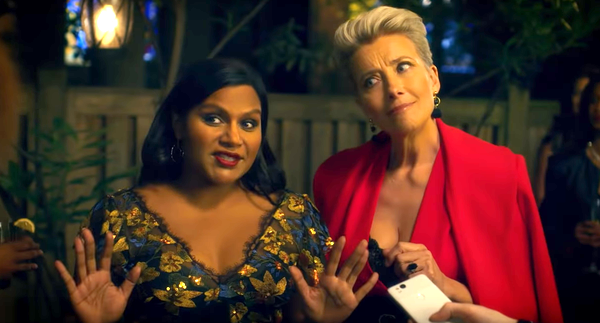By Stacy Nguyen
Northwest Asian Weekly

Mindy Kaling (left) and Emma Thompson (right) in a scene from the trailer.
![]()
![]()
![]()
![]()
I went into “Late Night” with fairly low expectations. It’s rated 79 percent on Rotten Tomatoes and 71 percent on Metacritic and 6.3/10 on IMDB, which while not bad at all, the movie severely underperformed at the box office over the weekend. My working theory is because men hate movies about women and the things that women care about. (Go ahead and send me your long-winded rebuttals on this; my inbox is waiting for you, dude/random woman who likes to defend dudes.)
“Late Night” is about an aging, legendary late night TV host-slash-comedian Katherine Newbury (Emma Thompson), who is forced into retirement in favor of a decades-younger white bro-comedian with a robust YouTube following (Ike Barinholtz). Katherine launches a last ditch effort at saving her show, and in the course of that, brings on a diversity hire because her writers’ room is all white males. The diversity hire is Molly (Mindy Kaling, who also wrote the screenplay).
I walked into this movie expecting a lot of tropes because the pre-reviews I peeped kept telling me the movie is cliched and boring. So I expected Molly to single-handedly save the day with her plucky woman of color sass. I expected all of her male colleagues to be one-note and really resentful of her success. I expected Emma Thompson to be a cipher for the audience, teaching us a simplistic thing or two about the richness of inclusiveness and ethnic diversity. I worried about lack of nuance.
I tried to get my brother to watch this movie with me. When I told him I needed to watch a movie to write a review for Northwest Asian Weekly, he was like, “Ooh! Which one?”
I told him “Late Night.” He had never heard of it.
I explained that it was a Mindy Kaling movie.
He said, “Oh. She’s so annoying.”
And he’s not at all the first male to say this about her. I have heard a lot of male friends tell me that Mindy Kaling is annoying. Do you know why they think she’s annoying? Because they don’t want to sleep with her.
Kaling tends to write and play characters who are confident in themselves despite apparently dripping off a checklist of marginalized traits: She’s not white, she’s not 20-something, she’s not stick-thin, her voice is girly, and she has an affection for romantic comedies and writes about love and relationships between people.
Actors like Emma Stone and Jennifer Aniston have done similar roles a lot (except they don’t write)—yet, there isn’t this trend of people stating en masse that Jennifer Aniston is annoying and that she always plays the same character all the time.
“Late Night” is actually so good. I was struck by how grounded the movie’s writing was. I expected a lot of cute punchlines and the gloss of a rom-com, but what it actually was was a character study with comedic moments of uplift.
It was beautifully shot by Nisha Ganatra, shot like it was a straight up drama. It had this varied visual interest to it. It had this rawness and this realness. There were so many close-ups of Emma Thompson’s really beautiful, pained face.
“Late Night” is a sad and tragic movie at many points. It’s a movie that deals with loneliness and isolation—Molly has few friends, is often alone, isn’t dating anyone, and up until her lucky break, she lived a quiet life and worked a dead-end job at a chemical plant. Katherine is self-hating and singularly focused. She finds purpose in only two entities: her show and her husband (John Lithgow), who has Parkinson’s.
“Late Night” is about a woman who is so ambitious and so committed to excellence that she is unable to make emotional connections with other human beings because she is so uncompromising and so bored by mundanities of life. It was mesmerizing and a little masochistic, watching Thompson’s character struggle with her age in an industry (or world) that favors youth and men. It was also scary to watch because omg, this is our future.
It was also really cool to see how Kaling deftly set up a bunch of tropes in the story—and then completely sidestep most of them! (The ones she knocked over was done purposefully, for the sake of comedy.) White dudes are not the villains just because they are white in this movie. Molly acts like an adult woman the entire time and makes logical decisions, not decisions in service of a plot point. A bunch of ideas and thoughts around diversity and tokenism get offered up—and from different points of views and in interesting, varied ways.
This movie also isn’t about a young woman finally finding love. It’s about an older woman reaffirming a love. And it’s about a young woman just hustling so hard to get the approval of an impossibly hard-to-please female boss—and basically always failing at it. I loved that—because we have built an entire cult around the Obi Wan and Luke Skywalker archetype, that we think that only men mentoring other men is compelling, watchable stuff.
I am telling you, it is not that. It was so novel to watch a woman mentor another woman—and it was in watching it that I realized I want more of this, please.
But, basically, watch for Emma Thompson. She is brilliant and magnificent in this.
“Late Night” is out in theaters right now. Check your local showtimes.
Stacy can be reached at stacy@nwasianweekly.com.



